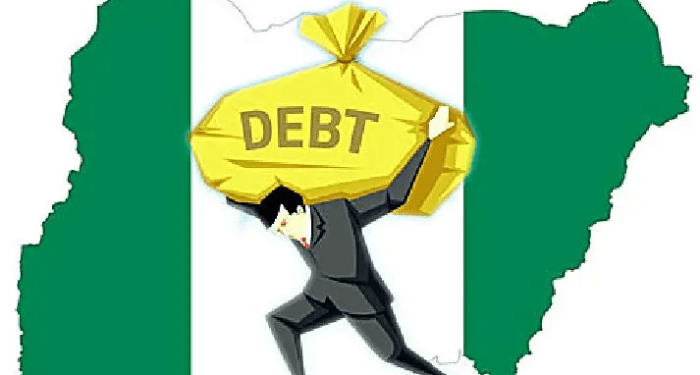Nigeria, debt and growth
The recent warning by the International Monetary Fund (IMF) that Nigeria’s decade-long rise in public debt could if allowed to continue, create financial and revenue squeeze for the economy in the medium term must be given urgent attention by the authorities.
The Fund’s mission Chief to Nigeria, Jesmin Rahman in the IMF/Nigeria 2021 article IV consultation staff press conference stated that though the country’s current debt dynamics at the moment seem favourable as it still resides within the 30 percent threshold, it’s trajectory, however, would become a major economic concern in the medium term.
“Public debt threshold for emerging markets stand at 10 percent; however, Nigeria currently spends above 80 percent to service its debt.
We cannot be talking about having any meaningful growth in the economy if we do not spend more on the productive sector
“Recent estimates indicate that public debt is to increase from 36 percent to 40 percent in the medium term. Should this happen, it is going to become a major cause for concern for the Nigerian government,” she said.
Debt servicing for Nigeria since the oil decline in 2020 has been dependent on the Central Bank of Nigeria (CBN) overdraft and Eurobond subscriptions.
While Nigeria’s Eurobonds are oversubscribed, dependence on Eurobonds has remained quite risky as economic volatility could translate to both financial and revenue squeeze for the Nigerian economy which in turn further escalates the country’s rising debt.
Nigeria’s debt trend is not looking favourable on the debt portfolio end but the estimates are dependent on various economic factors. Whether debt becomes stressful or not is dependent on a number of factors like growth, interest rate, oil prices, financing situation in the country amongst others.
Nigeria’s debt service is currently suffocating federal spending and by extension the general economy with severe effects on the living conditions of Nigerian households. Accompanying this grim reality is the government’s heavy reliance on oil revenues which have been extremely anaemic in the last couple of years.
Dwindling oil revenues which emanated in 2020 as a result of slump in oil prices in the international market due to the covid-19 pandemic, necessitated the Nigerian government to rely heavily on borrowing (both external and domestic), to finance its projects and close up budget deficits.
It baffles the mind why the country’s borrowing has been significantly on the rise since 2016 with no evidence of growth in infrastructure, manufacturing and human development to justify the huge borrowings.
From an external debt of $10.31bn and total public debt of $63.806bn or N12.1trn in 2015, the figure almost tripled to $37.95bn for foreign debt and $92.626bn or N38.0trn for total public debt as at September 2021, representing a 268 per cent increase in external debts and a 214.0 per cent increase in total debts.
In a failed attempt to sustain these debts, the Federal Government spends trillions of naira yearly servicing more debts.
Since 2017, this administration has spent a total of N15.375trn on debt servicing, excluding N296bn and N110bn allocated for sinking funds in 2019 and 2020.
Read: Stronger dollar remains a risk for emerging-market sovereigns
We cannot be talking about having any meaningful growth in the economy if we do not spend more on the productive sector.
From the potholed and often barely paved streets of Lagos to moribund refineries around the country to accident-prone highways on Federal roads to inadequate health and education infrastructure, we are constantly reminded of the country’s urgent need for infrastructural development.
This is one of the reasons that, when the base effect is taken out of the equation, we still see Nigeria’s growth rate lagging behind population growth rate. At the same time, recurrent expenditure continues to increase with huge implications on the fragile economy.
In the face of these inclement features, it remains to be seen how sustainable our public finance is. Between 2017 and 2022, Government budgeted a total of N19.16trn for capital expenditure (money spent to buy, maintain or improve fixed assets).
Data from the Budget Office revealed that in the 2017 fiscal year, Federal Government spent N2.177trn out of N7.441trn aggregate revenue as capital expenditure, representing 29.25 per cent of the total revenue in that year.
For 2018, N2.873trn was expended on capital projects, which was 31.50 per cent of N9.120trn total expenditure.
In 2019 and 2020, N2.090trn and N2.140trn, respectively, were spent as capital expenditure. The figures represented 23.43 per cent and 20.71 per cent of aggregate expenditure for the years which were N8.920trn and N10.330trn, respectively.
The amount budgeted for capital expenditure rose in 2021 and 2022 to N4.989trn and N4.891trn for capital projects indicating 34.24 per cent and 29.83 per cent of aggregate expenditure for the years at N14.570trn and N16.391trn, respectively.
With 40 percent of Nigerians still living below the poverty line, Nigeria’s revenue projection is beginning to look unattainable.
If all our revenue is going to the servicing of debt, it means we have major fiscal problems which could have dire consequences in the near future.
In order to restore balance, two critical realities are non-negotiable. First, productivity has to increase which in turn would translate to increased revenue. Secondly, government should begin to invest heavily in productive activities to avoid the ever inflating debt crisis doing more harm to the already shrinking economy.








